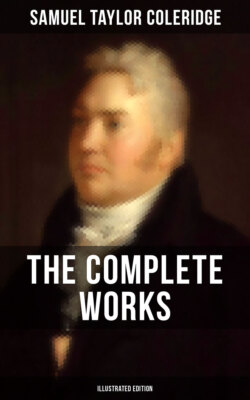Читать книгу The Complete Works of Samuel Taylor Coleridge (Illustrated Edition) - Samuel Taylor Coleridge - Страница 220
На сайте Литреса книга снята с продажи.
SCENE VI
ОглавлениеTable of Contents
To them enters the COUNTESS TERTSKY.
Countess. Come!
My husband sends me for you — It is now
The latest moment.
Part you!
Thekla. O, not yet!
It has been scarce a moment.
Countess. Aye! Then time
Flies swiftly with your Highness, Princess niece! 5
Max. There is no hurry, aunt.
Countess. Away! Away!
The folks begin to miss you. Twice already
His father has asked for him.
Thekla. Ha! his father?
Countess. You understand that, niece!
Thekla. Why needs he
To go at all to that society? 10
‘Tis not his proper company. They may
Be worthy men, but he’s too young for them.
In brief, he suits not such society.
Countess. You mean, you’d rather keep him wholly here?
Thekla. Yes! you have hit it, aunt! That is my meaning. 15
Leave him here wholly! Tell the company —
Countess. What? have you lost your senses, niece? —
Count, you remember the conditions. Come!
Max (to Thekla). Lady, I must obey. Farewell, dear lady!
[THEKLA turns away from him with a quick motion.
What say you then, dear lady?
Thekla (without looking at him). Nothing. Go! 20
Max. Can I, when you are angry ——
[He draws up to her, their eyes meet, she stands silent
a moment, then throws herself into his arms; he
presses her fast to his heart.
Countess. Off! Heavens! if any one should come!
Hark! What’s that noise? It comes this way. —— Off!
[MAX tears himself away out of her arms, and goes. The
COUNTESS accompanies him. THEKLA follows him with
her eyes at first, walks restlessly across the
room, then stops, and remains standing, lost in
thought. A guitar lies on the table, she seizes it
as by a sudden emotion, and after she has played a
while an irregular and melancholy symphony, she
falls gradually into the music and sings.
Thekla (plays and sings).
The cloud doth gather, the greenwood roar,
The damsel paces along the shore; 25
The billows they tumble with might, with might;
And she flings out her voice to the darksome night;
Her bosom is swelling with sorrow;
The world it is empty, the heart will die,
There’s nothing to wish for beneath the sky: 30
Thou Holy One, call thy child away!
I’ve lived and loved, and that was to-day —
Make ready my grave-clothes tomorrow.
LITERAL TRANSLATION.
Thekla (plays and sings).
The oak-forest bellows, the clouds gather, the damsel walks to and fro
on the green of the shore; the wave breaks with might, with might, and
she sings out into the dark night, her eye discoloured with weeping: the
heart is dead, the world is empty, and further gives it nothing more to
the wish. Thou Holy One, call thy child home. I have enjoyed the
happiness of this world, I have lived and have loved.
I cannot but add here an imitation of this song, with which the author
of The Tale of Rosamond Gray and Blind Margaret has favoured me, and
which appears to me to have caught the happiest manner of our old
ballads.
The clouds are black’ning, the storms threat’ning,
The cavern doth mutter, the greenwood moan;
Billows are breaking, the damsel’s heart aching,
Thus in the dark night she singeth alone,
Her eye upward roving:
The world is empty, the heart is dead surely,
In this world plainly all seemeth amiss;
To thy heaven, Holy One, take home thy little one,
I have partaken of all earth’s bliss,
Both living and loving.
The text of Lamb’s version as printed in Works, 1818, i. 42 is as
follows:
BALLAD.
FROM THE GERMAN.
The clouds are blackening, the storms threatening,
And ever the forest maketh a moan:
Billows are breaking, the damsel’s heart aching,
Thus by herself she singeth alone,
Weeping right plenteously.
The world is empty, the heart is dead surely,
In this world plainly all seemeth amiss:
To thy breast, holy one, take now thy little one,
I have had earnest of all earth’s bliss
Living most lovingly.
Spring, 1800.
The latest, &c. [They not appearing to attend to what she says,
she steps between them.
1800, 1828, 1829.
